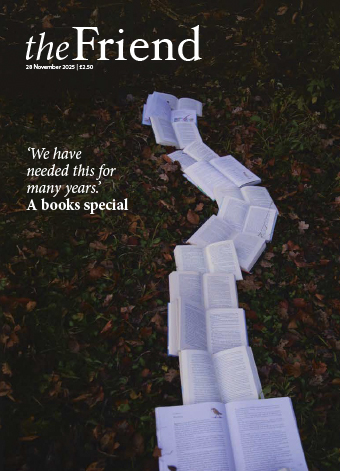
The Friend is a weekly magazine in which Friends speak to each other and to the wider world, offering their insight, ideas, news, nurture and inspiration.
Nurturing Quaker community, each issue offers a space for Friends to share their concerns, and to support each other in faith and witness.
The Friend: enriching, inspiring and connecting the Quaker community since 1843.
‘My folks were Quakers… I’m a Quaker too except I hardly ever go to Meetings. I’m at home with these people.’ In the late 1980s, Iris Murdoch is writing a novel with the hubristic title The Message to the Planet. By halfway through, a familiar caste of characters – post-faith, questing and obsessive – has turned the screw of the narrator’s plot so tightly that a miracle might well be needed to sort the whole conundrum out. Enter Maisie Tether, Murdoch’s most striking depiction of Quaker sensibility. She is to have a decisive effect on all the principal characters. The narrator quietly hints at the nature of that effect when we hear of Maisie visiting the Lake District: ‘they had found the very pond where Wordsworth had met the Leech Gatherer!’ Wordsworth’s chance encounter with the leech gatherer is forever after associated with recovery from despondency and dejection: ‘like a man from some far region sent, | To give me human strength, by apt admonishment.’
Born and raised in Philadelphia, William Penn’s Quaker city, I was familiar with the Society of Friends from an early age. My father, a lawyer, gave lectures on fighting bigotry and intolerance at Friends’ organisations and Meetings. I admired and sympathised with the Quaker testimonies when I discovered them in high school. As an opponent of the Vietnam war, I became a pacifist under Quaker influence. It was in the air all around me.
In 1727, Ellis Pugh, a Welshman living in Pennsylvania, wrote a book entitled: Annerch ir Cymru (translated as ‘Salutation to the Britons’). In it he explained the Quaker faith and expounded on baptism, communion and other topics. Quaker faith & practice 2.05 offers a brief excerpt. Significantly, this was the last publication written by an individual Quaker in Welsh until this year. Gethin Evans has filled that 300-year publication gap by writing a series of essays under the title Neuadd Fawr (The Broad Hall), a reference to the poem by the Quaker poet Waldo Williams, ‘Pa beth yw dyn?’ (What is humanity?), where he asks,‘what is life?’
Dis Gyrl holds the memories of almost 100 years of someone who grew up in British Guiana, before the second world war, who lived a very full professional life in education there and in England, and now in her nineties has been a faithful Quaker for almost fifty years. It gives a glimpse into the world of a colonised country, which had been at the heart of chattel slavery and the plantation system. A world whose aftermath is experienced by a young girl living a poor and mainly rural existence in Demerara, with an unmarried mother and an extended family. A girl who is being educated to be more English than the English, and who, ninety years on, is able to write to Charles Windsor about the British slave trade and its impacts – and also to Keir Starmer in defence of Diane Abbot’s position on the significance of skin colour.
Now seems like a good time to re-publish this book. 2025 marks the eightieth anniversary of Hiroshima, and of the founding of the United Nations. We have war in Europe, Gaza and elsewhere. People mutter about nuclear bombs, and these and the UN are preoccupations of Kathleen Lonsdale’s classic study. Canongate has done the book proud.
Erica Canela’s book shows that she is fluent in Quaker language and mores, which many historians are not. This fluency enables her to produce sound interpretations of a range of extracts from Minutes and seventeenth-century Quaker writings, which she quotes in this history of early Worcestershire and Herefordshire Friends.

Become a subscriber to enjoy unlimited access to our articles, dating back to 2009! Online subscribers get the Friend to their inbox each week, can comment on articles, and dive into our 1914-18 digital archive too!
Whether you are new to Quakerism or have been going to Meeting for years, you’ll find something here to inspire, inform and challenge you.
News | Views | Reviews
Written by and for Friends on the bench
Subscribe